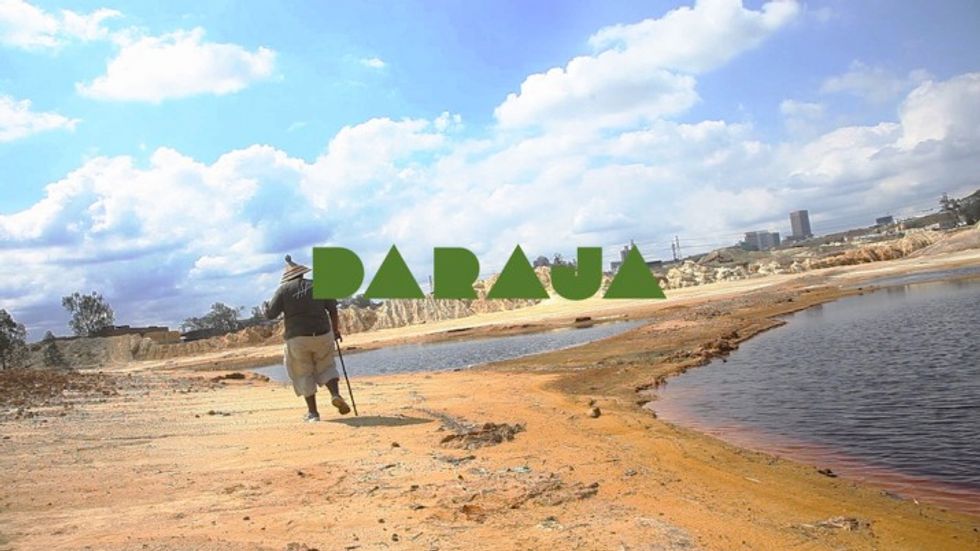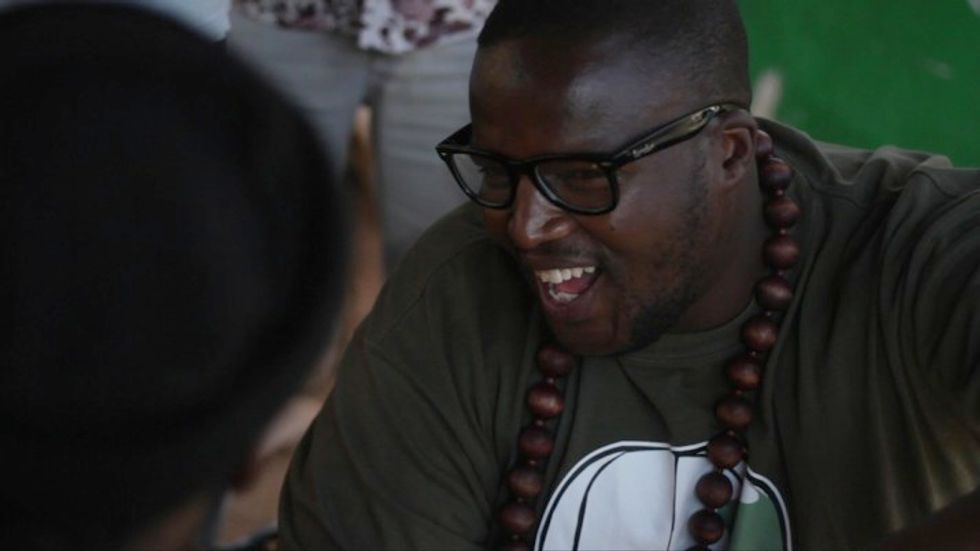Interview: Hip Hop Pantsula On His Daraja Walk And The Future of Africa
South African Hip Hop Pantsula discusses his socially conscious Daraja Walk from southern to eastern Africa with DJ Zondi.

With the hope to spark dialogue amongst African youth, Hip Hop Pantsula (HHP) and DJ Zondi set out on 16 June 2013 (South Africa's Youth Day) to walk from Southern to Eastern Africa. On their way, the South African emcees met and collaborated with local artists. We caught up with HHP during his week in Malawi to hear the Motswako forefather speak about the purpose of his Daraja Walk, how artists can contribute to social justice, and the role that African youth have to play in determining the future of the continent.
OKA: What brings you to Malawi?
HHP: We’re doing this walk called Daraja. Daraja is Swahili for “the bridge,” it’s a bridging-the-gap movement. Initially it was supposed to be a big corporate-funded thing, but every one pulled out at the last minute. We decided to pay things upfront for the year and just do this ourselves. That introduced us to a new dimension of the walk, which is the real experience of ubuntu. Ubuntu in South Africa is meant to be the humanity, the whole warmth of being African and quite frankly from what I’ve been experiencing, ubuntu is really just a word back home. Going into Botswana, we started seeing it in motion. Without even knowing who you are, people will take you in, they’ll feed you, they’ll believe in the cause. Whenever something like that happens, it just reaffirms that we’re doing a good thing here, even though it might not pay off now. It’s a ripple effect that might just hit people twenty, thirty, maybe years after we pass away. So many people have done great things that are still being echoed, Mahatma Ghandi, Martin Luther, Malcom X, these people.
The aim of Daraja is to take South African youth out of South Africa, out of the streets of Soweto, and into the history books of Africa. The walk is not so much about the action of walking but the action of meeting people, interacting, and just spreading the message of the importance of Africa having its own industry and its own identity in the world. It’s mainly about sparking dialogue amongst African youth. Everybody has their own heritage and their own history but what if we were integrated and working together — through passports that allow us freely into each other’s countries or through trade — to some degree? With me, it’s very important that I see in the future an African music industry where people from their homes, wherever they are, have a satellite radio that allows them to catch radio stations from all over the continent just to have a vibe of what’s going on; or a record label that distributes throughout the continent. There’s so much to be done, Africa’s a clear canvas at the moment.
OKA: You’re known as quite a socially conscious artist. What is it that raised your consciousness and how does that feed into your work as an artist?
HHP: I met this great poet called Q from Malawi, this guy is really a gem. He is one person that I think the world needs to hear because in the two and a half minutes that I spent with him, he said some stuff to me that made me re-think my career and what it is that I’m doing. He made mention of the fact that artists are almost like transparent beings, we have no choice but to express what we feel in our work. With music, you’re kind of a social commentator. What you see around you, your surroundings, affect who you are. My career has been built by the people that have been around me. My first albums reflect the people I had around me, record execs telling me what they think I should sound like. When I started hanging out with realer people and started writing about realer things that I experience every day, more people started relating to my music.
One time in my career, I did a documentary called Who Do You Think You Are? where they track down your family, it’s a BBC show. The whole time growing up I’ve been thinking I’m this Shangaan boy. When they did the documentary, they traced my history and it turns out that my grandfather is a man from Mozambique. He came to South Africa in 1887 with a group of Shangaan guys. Our family hasn’t been keeping in touch with our true roots, our language. Finding that out left me a bit unrooted because I’m known as this South African musician who raps in one of the minority languages seTswana, really taking it to big heights and I actually don’t even know who I am, I don’t know my family like that and I don’t know my language as well. So my need for finding out what’s going on in Africa became even more real.
Finding out about the xenophobic attacks in 2008 left me a bit disgusted, especially when I read that people were taking Shangaans from Mozambique, saying they must go back to Mozambique. I was thinking there are Shangaan people in South Africa. They are attacking Ndebele people from Zimbabwe but there are Ndebele people in Mpumalanga, or Tswana people from Botswana but there are Tswana people also in South Africa. It made me think, do the young people even know the contribution that Africa has to who they are? When you trace it back, they are actually fighting against their cousins or their brothers. So that’s always been conscious in my approach to music, even the Motswafrika album was based on the idea that if Africa was the last continent on earth as in the 2012 movie, and all these people are now coming to Africa as refugees – what Africa are they going to find? Are they going to find an Africa that’s still fighting amongst itself, are they going to find an Africa that has a common language of commerce? Do we ever sit around water coolers and spark this kind of debate? Hopefully the walk will do that.
OKA: Do you think artists can contribute to social change?
HHP: Artists definitely can contribute to social change. I’ll go back to my story that I always tell. Most kids who grew up in Mafeking, their mothers would have probably told them this story. It’s a story of the elephant and the ant. There’s this massive rogue elephant in the jungle causing havoc everywhere. Everyone is afraid of it. Lions would attack it from the left and it will just bash them over there, leopards would attack it from the right and it would just bash them over there, nobody could take this elephant down. So one day this little ant thought to itself, you know what? I can take out this elephant. The ant challenged this elephant, it said, elephant, you’re causing too much trouble, I’m ready to take you on. The elephant said look at you, you’re so tiny, you think you can take me out?. The ant went up its leg, went into the trunk, blocked its air holes and the elephant died. All the animals in the jungle reigned the ant supreme and came in and feasted on the elephant while the ant watched from a branch.
What’s the moral of the story? I think the elephant represents all the social ills and problems that Africa’s facing today, be it malaria, xenophobia, tribalism, abuse of women, homosexual issues, extreme poverty, every issue that you can think of that’s going on in Africa represents that elephant. The lions could represent presidents. Presidents have tried to tackle this matter on the one side and they’re failing, the organizations are trying on the other side and they’re also equally failing. And the ant represents art — a-n-t/a-r-t — art I think has the power of seeping through the smallest cracks. We saw what art did with the civil rights movement, we saw what art did with the bringing down of the Berlin Wall, we saw what art did with Apartheid. And on the flip side, we have also seen how art could evoke some serious damage, Hitler was an artist to begin with. Artists have the power to evoke strong emotions in people or healing people as well. So on that note I do think art has a strong part to play in changing a lot of minds out there, a lot of perceptions. Art has the ability to transcend from being something you pay money for and enjoy to something that can physically invoke change in people.
OKA: What is your message to the youth of Africa?
HHP: I think there’s this illusion that we remain young forever, which is continuously being perpetuated in the music today ("Forever Young," "Live Fast Die Young") but we’re all going to get old and part of this walk is to connect with these youth that are right now drinking in a club somewhere, just being blasé about life — tomorrow they could actually be teachers that could teach the next president of a united Africa, they could be ministers of arts and culture in their own countries, they could be mayors. We want to see politicians with morals. Today I feel like morals and politics are separated. This is about starting small. You don’t have to be a DJ or a musician or anything crazy to make change. It starts with small things that have ripple effects. There’s this restaurant I went to in Washington, D.C. called Karma, and in this restaurant you go in there, you order whatever you want, you eat, and after you eat the waiter comes to you and says “The meal that you ordered was actually paid by the person that came before you, so it’s up to you if you want to pay for the next person after that.” That’s what I’m hoping that young Africans can do today. What kind of Africa are we creating? One good deed for another African might lead to something else. This is ubuntu in motion; this is Africa.




